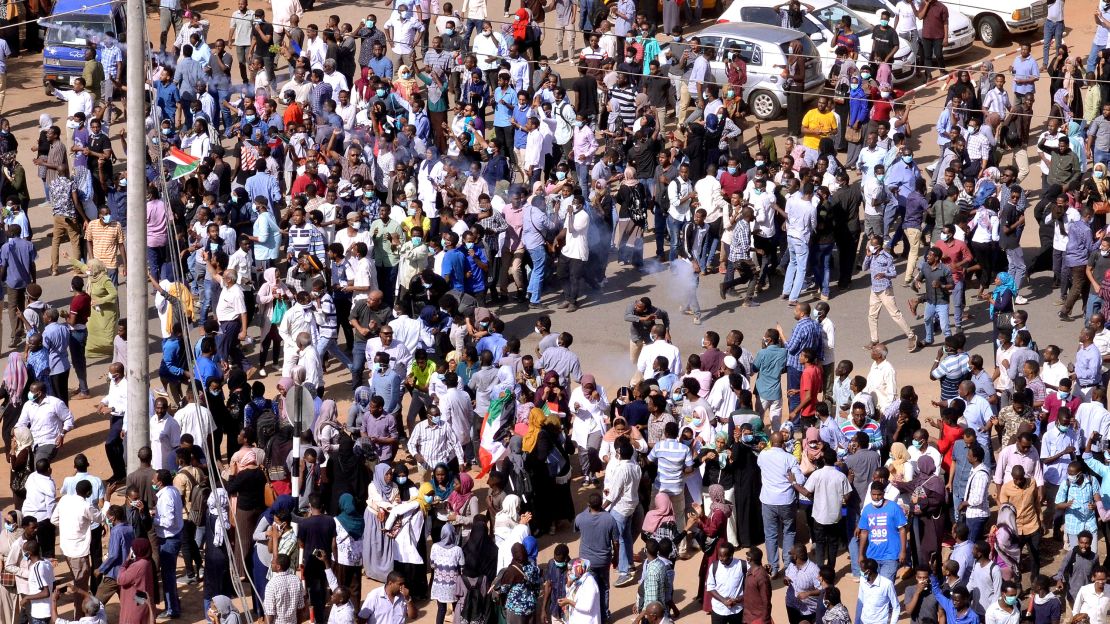Anti-government protesters in Sudan faced a violent crackdown Tuesday in the capital of Khartoum, marking the seventh day of demonstrations that have rocked the northern African country.
The protesters – organized by a group of professional unions including doctors, lawyers, teachers and students and supported by two of the largest opposition parties – are calling for President Omar al-Bashir to step down.
The demonstrations began over fuel shortages and a spike in food prices that saw the cost of bread double in the past year.
But they soon evolved into a wider call for the controversial leader to resign.
Bashir, who was charged with crimes against humanity, including genocide, by the International Criminal Court related to the Darfur conflict in Sudan in 2010, has been President for almost three decades.
Sudan is oil-rich, but poverty is rife in the country, with many of Bashir’s critics attributing its economic woes to widespread corruption.
Nearly 20% of the labor force is unemployed, according to recent International Monetary Fund data; inflation reportedly has soared to nearly 70%.
In videos, protesters can be seen chanting, “The people want to topple the regime,” and “Freedom! Freedom,” evoking memories of the 2011 Arab Spring uprising.
Security forces have sought to quash the protests by shooting live fire and tear gas into crowds of peaceful demonstrators, witnesses have told CNN.
At least 37 people have been killed since the protests began, according to Amnesty International, which has called for the immediate halt of the government’s violence against protesters.
“The fact that the security forces are using lethal force so indiscriminately against unarmed protesters is extremely troubling,” Sarah Jackson, Amnesty International’s deputy director for East Africa, the Great Lakes and the Horn, said in a statement Monday.
At the demonstrations Tuesday in Khartoum, activist Ahmad Mahmoud told CNN that riot police had arrived in armed trucks and had “boxed us in.”
“They threw at least a dozen gas canisters at us,” he said.

A representative from the demonstrating Central Doctors Committee, who declined to be named for fear of retribution, told CNN that four of the group’s members – including a doctor, surgeon and medical student – had been shot by snipers Tuesday and were recovering in the hospital.
The United States, Norway, the United Kingdom and Canada issued a joint statement Monday saying they were concerned about violence during the protests, including “credible reports of the use of live fire by the Government of Sudan and of multiple deaths” and called on the government to avoid violence, arbitrary detention and media censorship.
‘It looks like a battlefield’
Sudanese opposition politician and human rights activist Rudwan Dawood told CNN that hundreds of security vehicles and forces had blocked access points Monday night into Khartoum ahead of the demonstrations.
“Khartoum does not look like Khartoum anymore; it looks like a battlefield,” Dawood said, adding that he was protesting the President because “he has failed us.”
On Tuesday, Bashir called protesters “traitors and foreign agents” who have “abused the hardship of living to cause sabotage in favor of Sudan’s enemies,” state-run Sudan News Agency reported.
He vowed to chase down those who have demanded his arrest and reiterated that the government is moving forward with development projects that would benefit the people and “fix their situation” without providing any specifics.
Bashir said that a “war on Sudan” is being waged because of the President’s “strong ties to his religion and his dignity that cannot be sold for wheat or money.”
Several schools across the country have been closed, and a state of emergency has been called in some regions. Authorities have banned access to popular social media sites such as Twitter and Facebook, a crucial platform for activists hoping to spread information and organize, but many said they have been able to circumvent the ban with a virtual private network, or VPN.
CNN’s Paul P. Murphy contributed to this report.




